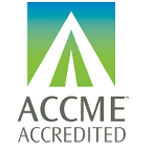Continuing Medical Education

Accreditation Statement
The American Association for Cancer Research (AACR) is accredited by the Accreditation Council for Continuing Medical Education (ACCME) to provide continuing medical education activities for physicians.
Credit Designation Statement
AACR has designated this live activity for a maximum of 18.50 AMA PRA Category 1 Credit(s)™. Physicians should only claim credit commensurate with the extent of their participation in the activity.
Credit certification for individual sessions may vary, dependent upon compliance with the ACCME Accreditation Criteria. The final number of credits may vary from the maximum number indicated above.
Claiming (CME) Credit
Physicians and other health care professionals seeking AMA PRA Category 1 Credit(s)TM for this live continuing medical education activity must complete the online CME Request for Credit Survey by November 6, 2024. Certificates will only be issued to those who complete the survey. Your CME certificate will be sent to you via email after the completion of the activity.

Successful completion of this CME activity, which includes participation in the evaluation component, enables the participant to earn up to 18.50 Medical Knowledge MOC points in the American Board of Internal Medicine’s (ABIM) Maintenance of Certification (MOC) program. Participants will earn MOC points equivalent to the amount of CME credits claimed for the activity. It is the CME activity provider’s responsibility to submit participant completion information to ACCME for the purpose of granting ABIM MOC credit.
To receive ABIM MOC, participants must request MOC in the CME Request for Credit Survey and complete all questions. Once these steps are completed, AACR will submit your completion information via the ACCME’s Program and Activity Reporting System for the purpose of granting MOC points.
Statement of Educational Need, Target Audience, and Learning Objectives
Recent events have underscored the pervasive nature of these cancer disparities. Data indicate that biological and social factors contribute significantly across the cancer care spectrum. Cultural differences, language barriers, financial constraints, and physical obstacles hinder access to effective cancer treatment for many individuals and communities. Moreover, genetic predispositions in specific underserved populations, the availability of tailored interventions, and environmental influences on cancer risk all play crucial roles. Disparities in prevention, diagnosis, treatment, survivorship, screening guidelines, and access to interventions further affect risk, treatment outcomes, and survival rates among medically underserved populations.
Emerging technologies and research fields such as genomics, ‘omics’ technologies, community engagement, socio-economic studies, data science, basic research, population science, climate science, and behavioral science offer promising multi-level approaches to addressing cancer disparities and promoting health equity.
To reduce the burden of cancer due to health disparities, there is a need to educate physicians on the role of the various factors involved in creating health disparities and how they impact the diagnosis, treatment, response, and survival of cancer patients from racial/ethnic minorities and medically underserved populations. This conference will bring together a wide range of physicians, scientists, health professionals, and health care leaders to discuss the latest findings in their fields, to foster collaborative interdisciplinary interactions and partnerships, and to stimulate the development of new research and clinical practices aimed to reduce cancer health disparities and provide the most appropriate care for a diverse patient population.
After participating in this CME activity, physicians should be able to:
- Articulate how environmental, social, and biological factors contribute to disparities in cancer risk and incidence.
- Evaluate the effectiveness of different interventions aimed at reducing cancer disparities in medically underserved populations.
- Explain the role of genetic susceptibility, socioeconomic status, environmental factors, and access to healthcare in preventing and treating cancer.
- Identify specific factors influencing the development and treatment of cancers among patients from medically underserved populations.
- Analyze how screening practices, testing methods, and biological factors impact the survivorship and quality of life among cancer survivors from medically underserved populations.
- Evaluate the impact of emerging technologies and approaches in cancer research and care, assessing their potential to mitigate or exacerbate cancer disparities.
Disclosure Statement
It is the policy of the AACR that the information presented at AACR CME activities will be unbiased and based on scientific evidence. To help participants make judgments about the presence of bias, AACR will provide information that Scientific Program Committee members and speakers have disclosed all financial relationships they have with ineligible companies whose primary business is producing, marketing, selling, re-selling, or distributing healthcare products or services used by or on patients. All of the relevant financial relationships for these individuals have been mitigated.
Acknowledgment of Financial or Other Support
The AACR gratefully acknowledges the following commercial supporters for their Professional Educational Grants:
- Gilead
- Lilly
- AbbVie
- Novartis
- Pfizer
Questions about CME?
Please read our frequently asked questions contact the Office of CME at (215) 440-9300 or cme@aacr.org.
